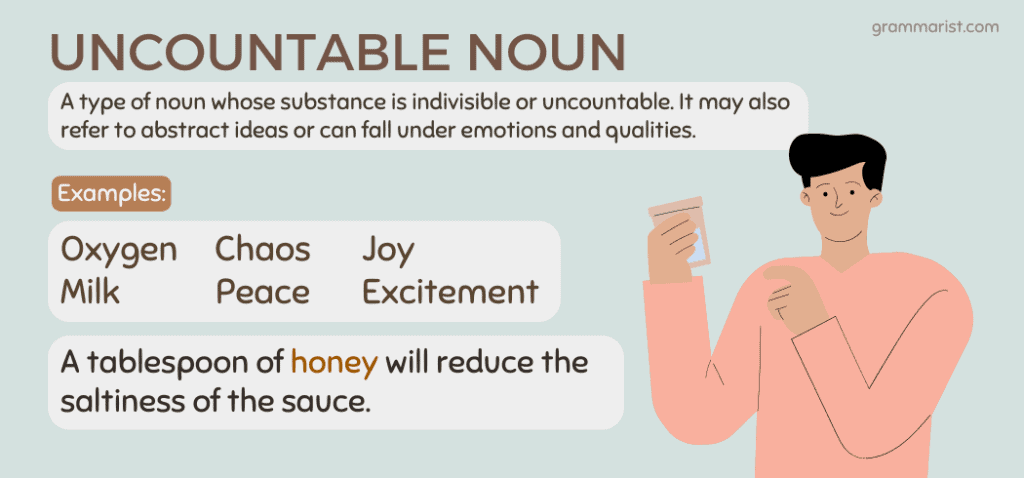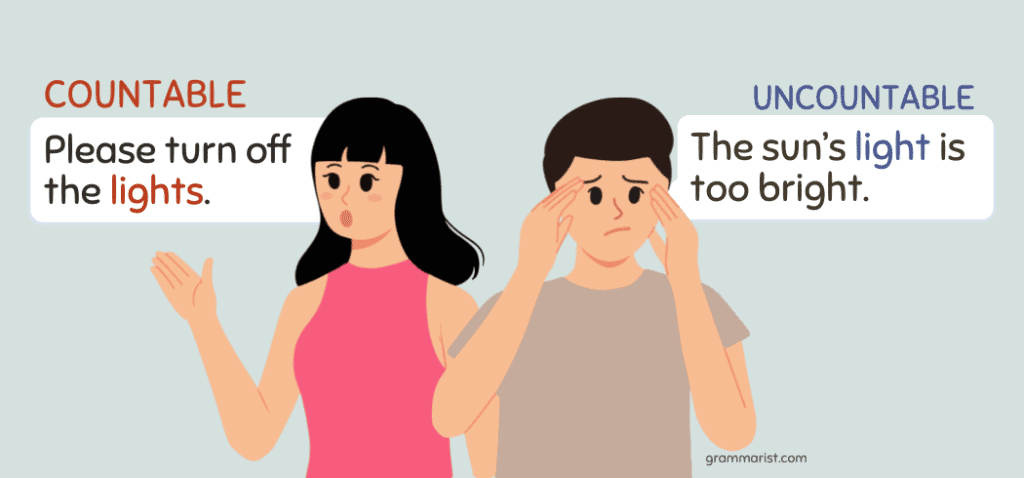The English language is divided into several types of nouns according to their specificity, quantity, and tangibility. One classification you might have heard of is uncountable nouns. But what is an uncountable noun? Is there such a thing? Of course! And I’ll explain everything you need to know.
An uncountable noun is any person, place, idea, or object that cannot be counted. In this guide, I’ll show you the definition and usage of uncountable nouns along with a long list of uncountable nouns.
What Is an Uncountable Noun?

An uncountable noun, mass noun, or non-countable noun is a type of noun whose substance is indivisible or uncountable. It can be food, weather, chemical elements, or collective nouns. Some uncountable noun examples include honey, oxygen, snow, and equipment.
An uncountable noun may also refer to abstract ideas. That means they are usually abstract nouns like chaos, capitalism, and peace.
Some uncountable nouns can fall under emotions and qualities like joy, anger, excitement, bravery, and intelligence.
Here are some examples of uncountable nouns in a sentence.
- I like drinking oat milk.
- A tablespoon of honey will reduce the saltiness of the sauce.
- My family is my pride.
- Wind refers to moving air.
What Are the Rules of Uncountable Nouns?
Uncountable nouns should adhere to specific grammar rules. Let’s take a look at the guidelines.
Uncountable Nouns Are Singular
We usually treat mass nouns as singular. For example:
- Her advice was very enlightening.
- I have heavy luggage.
- The news about the economy is alarming.
Even if they are singular, we don’t use the indefinite articles a or an with uncountable nouns. For example:
- Incorrect: A new information was announced about the graduation.
- Correct: New information was announced about the graduation.
- Correct: A new piece of information was announced about the graduation.
Some and Any With Uncountable Nouns
Some and any are two determiners you can use with uncountable nouns. For example:
- I’ve got some rice.
- Do you have any money?
Little and Much With Uncountable Nouns
Other determiners you can use with uncountable nouns include much and little. For example:
- The pitcher has a little water.
- I don’t have much money.
Partitive Structure With Uncountable Nouns
Always use measurement units with uncountable nouns to make them countable. Do not say two breads because breads is uncountable. Instead, say two slices of bread or two loaves of bread. This phrase is called a partitive structure.
Partitive structures have four parts:
- Quantity + measure word + of + uncountable noun
- Three games of badminton.
Here are other examples:
- The family is donating three kilos of rice to every victim.
- I received three pieces of paper from him.
- We found some items of clothing in her room yesterday.
- I need a cup of coffee to brighten my day.
- Add a pinch of salt.
Replacing Uncountable Nouns With Countable Nouns
If you want to switch your uncountable nouns with countable nouns, here are some words to try.
- Luggage – suitcase/suitcases
- Money – dollar/dollars
- Furniture – table/tables
- Music – song/songs
- Wine – bottle/bottles
- Electricity – battery/batteries
- Information – report/reports
- Advice – tip/tips
- Travel – journey/journeys
- Work – job/jobs
- Scenery – view/views
Nouns That Can Be Countable and Uncountable

A countable noun can also be uncountable depending on the word’s meaning and the sentence’s context. For instance, some collective nouns can be countable or uncountable.
Americans tend to use collective nouns as singular, uncountable nouns. For example:
- The crowd is applauding.
- The jury has reached a decision.
The word light may also be countable or uncountable. For example:
- Please turn off the lights. (countable)
- The sun’s light is too bright. (uncountable)
But there are other nouns that can be countable/uncountable and they include:
- Currency
- Hair
- Paper
- Noise
- Time
- Room
- Work
- Water
- Coffee
List of Uncountable Nouns
Below is a long list of nouns that cannot be quantified. I even put them in alphabetical order to make it easy.
- Advice
- Attention
- Applause
- Anger
- Absence
- Arithmetic
- Access
- Adulthood
- Assistance
- Aggression
- Assistance
- Accommodation
- Advertising
- Air
- Alcohol
- Agriculture
- Atmosphere
- Art
- Aid
- Beef
- Bravery
- Beauty
- Behavior
- Beer
- Baggage
- Biology
- Bread
- Bacon
- Business
- Ballet
- Beauty
- Blood
- Botany
- Butter
- Chaos
- Confidence
- Cake
- Cash
- Carbon
- Cheese
- Currency
- Clamp
- Corruption
- Courage
- Chess
- Commerce
- Confusion
- Coal
- Cookery
- Countryside
- Crockery
- Chocolate
- Cutlery
- Content
- Cotton
- Coffee
- Childhood
- Data
- Democracy
- Determination
- Danger
- Dancing
- Damage
- Darkness
- Delight
- Depression
- Driving
- Dignity
- Dessert
- Dust
- Distribution
- Duty
- Dirt
- Designs
- Dessert
- Depression
- Evidence
- Employment
- Experience
- Energy
- Earth
- Expense
- Equipment
- Economics
- Education
- Environment
- Enthusiasm
- Envy
- Evil
- Engineering
- Entertainment
- Evolution
- Ethics
- Failure
- Fiction
- Fire
- Forgiveness
- fashion
- Existence
- Faith
- Flu
- Flour
- Fear
- Fun
- Fame
- Freedom
- Finance
- Food
- Fruit
- Fuel
- Friendship
- Furniture
- Flesh
- Gasoline
- Guilt
- Genetics
- Ground
- Gratitude
- Garbage
- Growth
- Grief
- Grammar
- Garlic
- Golf
- Grass
- Glass
- Gymnastics
- Gossip
- Gold
- History
- Housework
- Harm
- Hair
- Hardware
- Hydrogen
- Help
- Height
- Honesty
- Humor
- Honey
- Hunger
- Happiness
- Health
- Hate
- Hope
- Hospitality
- Ice
- Information
- Imagination
- Ice cream
- Infrastructure
- Independence
- Importance
- Intelligence
- Industry
- Irony
- Injustice
- Innocence
- Iron
- Inflation
- Insurance
- Jealousy
- Judo
- Jam
- Jewelry
- Juice
- Joy
- Justice
- Kindness
- Karate
- Knowledge
- Laughter
- Literature
- Logic
- Leisure
- Labor
- Lava
- Livestock
- Lightning
- Land
- Leather
- Linguistics
- Loneliness
- Lack
- Litter
- Luck
- Love
- Machinery
- Mankind
- Money
- Marriage
- Magic
- Marble
- Mercy
- Music
- Meat
- Management
- Mathematics
- Moonlight
- Methane
- Milk
- Metal
- Mayonnaise
- Mist
- Mud
- Motherhood
- Measles
- Motivation
- Nature
- Nitrogen
- News
- Obedience
- Oxygen
- Oil
- Passion
- Psychology
- Poetry
- Parking
- Pepper
- Permission
- Quartz
- Reliability
- Racism
- Rice
- Relief
- Respect
- Salt
- Safety
- Sewing
- Salad
- Scaffolding
- Soil
- Strength
- Seaside
- Stream
- Shopping
- Satisfaction
- Sand
- Satire
- Scenery
- Software
- Spite
- Steam
- Sorrow
- Snow
- Tea
- Tolerance
- Transportation
- Trust
- Trouble
- Temperature
- Thirst
- Technology
- Trousers
- Tennis
- Trade
- Understanding
- Usage
- Underwear
- Unemployment
- Unity
- Violence
- Veal
- Validity
- Vegetation
- Vinegar
- Vision
- Vegetarianism
- Vengeance
- Warmth
- Weight
- Welfare
- Water
- Wildlife
- Weather
- Wisdom
- Wood
- Wheat
- Wealth
- Wool
- Width
- Work
- Wealth
- Yoga
- Youth
- Yeast
- Zoology
- Zinc
Uncountable Nouns Are Essential
I hope my explanation and list of uncountable nouns help you use uncountable nouns properly in your sentences. Remember that uncountable nouns, non-count nouns, non-countable nouns, or mass nouns are nouns we cannot count.
If you want to make uncountable nouns countable, try looking for alternative words like dollar for money. You can also use partitive structures like two cups of milk.
